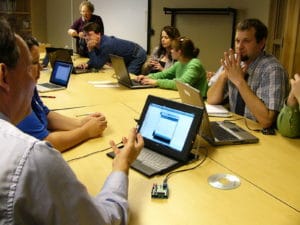As a result of two new grants, Stroud Water Research Center will be teaching EnviroDIY workshops in 2017 to watershed organizations and schools on building and deploying wireless stream sensor stations based on the EnviroDIY Mayfly data logger.
Our Delaware River Watershed Initiative (DRWI) Citizen Science grant, funded by the William Penn Foundation (WPF; grant #158-15), has enabled the Stroud Center to fully develop the EnviroDIY program, primarily by funding EnviroDIY sensor station workshops and development of online training and support materials at EnviroDIY.org and https://github.com/EnviroDIY.
The first of the EnviroDIY workshops will take place at the Stroud Center on January 26 and 27, 2017. At least five additional sensor station workshops will be scheduled in 2017 in partnership with DRWI watershed organizations and the Philadelphia Sustainable Business Network (SBN) Urban Stormwater Initiative.
The Stroud Center is also working with other organizations within the DRWI to construct, deploy, and maintain 50 EnviroDIY sensor stations throughout the Delaware River Basin.
 The EnviroDIY workshops for the DRWI audiences are part of the broader DRWI Watershed Science and Management Workshop Series that includes workshops on basic watershed ecology, project design and monitoring planning, restoration, and data management and curation topics, all of which are designed to support the continued development of citizen science capacity in the Delaware River watershed. This substantial effort is being done in collaboration with key Delaware River watershed organizations that are strategically monitoring the effects of newly established restoration and protection projects.
The EnviroDIY workshops for the DRWI audiences are part of the broader DRWI Watershed Science and Management Workshop Series that includes workshops on basic watershed ecology, project design and monitoring planning, restoration, and data management and curation topics, all of which are designed to support the continued development of citizen science capacity in the Delaware River watershed. This substantial effort is being done in collaboration with key Delaware River watershed organizations that are strategically monitoring the effects of newly established restoration and protection projects.
Our EPA-STEM Model Education grant (EPA Grant NE83675001-0 entitled “Greening STEM technologies: A model for advancing do-it-yourself (DIY) environmental sensing networks to support citizen science and primary and secondary education”) is supporting curriculum development for the use of EnviroDIY sensor stations with watershed-based citizen organizations and in K-12 classroom settings.
Also through this grant, teacher professional development workshops are being scheduled locally to support the test pilot the integration of EnviroDIY technology and curricula into varied classroom settings (e.g., math, science, vocational/technical), after-school, and extracurricular programs. The goals of this EPA grant include:
- Enhancement of public capabilities to use STEM skills to identify freshwater and environmental questions and develop appropriate scientific studies
- Create valuable, replicable, and robust curricula and tools that enable participants to collect and share environmental monitoring data and to make informed decisions in support of environmental stewardship
- Introduce GREENING STEM technologies and outlets for engagement in STEM learning experiences for citizen monitors and school students/teachers by learning to use open-source electronic solutions for monitoring air, soil, and water resources.
Updates on workshop progress under both these grants will be posted to this blog on a regular basis.

 Welcome to EnviroDIY, a community for do-it-yourself environmental science and monitoring. EnviroDIY is part of
Welcome to EnviroDIY, a community for do-it-yourself environmental science and monitoring. EnviroDIY is part of
This is very exciting news. Thank you for sharing it David. As an educator I’m certain that the EPA grant with curriculum and teacher training events will engage digital natives that are today’s K-12 students in STEM activities and help inspire them to consider STEM careers.